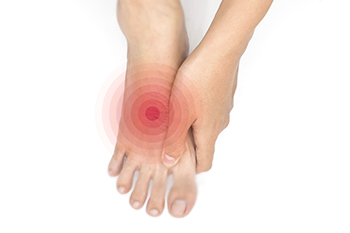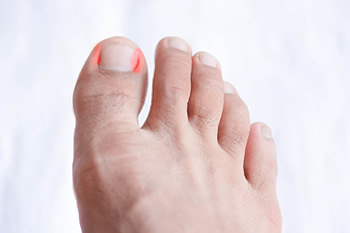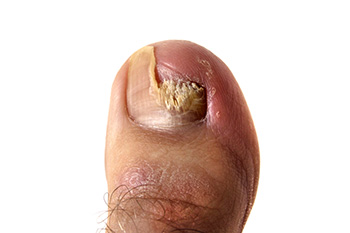Items filtered by date: December 2023
Foot Complications Linked to Diabetes

Diabetes is a chronic condition that affects how your body processes glucose. While it primarily impacts blood sugar levels, it can also lead to various health complications, including those related to the feet. Diabetes-related foot problems are a serious concern that can result from uncontrolled blood sugar levels over time. One common issue is neuropathy, where prolonged high blood sugar damages nerves, possibly leading to numbness, tingling, or foot pain. This sensory loss can make it difficult to notice injuries or ulcers. Another complication is poor circulation, which can slow down the body's ability to heal. Inadequate blood flow can lead to slow wound healing and increase the risk of infections. Diabetes can also cause changes in foot structure which may lead to issues such as bunions, hammertoes, and Charcot foot, a condition characterized by weakened bones and joints. Preventing diabetes-related foot problems involves maintaining good blood sugar control and regular foot care, in addition to choosing appropriate footwear. If you have diabetes, it is strongly suggested that you are under the care of a podiatrist who can help you address and prevent foot complications.
Diabetic foot care is important in preventing foot ailments such as ulcers. If you are suffering from diabetes or have any other concerns about your feet, contact Stanley Luksenburg, DPM from Home Foot Care. Our doctor can provide the care you need to keep you pain-free and on your feet.
Diabetic Foot Care
Diabetes affects millions of people every year. The condition can damage blood vessels in many parts of the body, especially the feet. Because of this, taking care of your feet is essential if you have diabetes, and having a podiatrist help monitor your foot health is highly recommended.
The Importance of Caring for Your Feet
- Routinely inspect your feet for bruises or sores.
- Wear socks that fit your feet comfortably.
- Wear comfortable shoes that provide adequate support.
Patients with diabetes should have their doctor monitor their blood levels, as blood sugar levels play such a huge role in diabetic care. Monitoring these levels on a regular basis is highly advised.
It is always best to inform your healthcare professional of any concerns you may have regarding your feet, especially for diabetic patients. Early treatment and routine foot examinations are keys to maintaining proper health, especially because severe complications can arise if proper treatment is not applied.
If you have any questions please feel free to contact our office located in Fairway Park, OH . We offer the newest diagnostic and treatment technologies for all your foot and ankle needs.
Managing Infected Ingrown Toenails

Ingrown toenails, a common problem causing pain and inconvenience, can affect anyone. However, they are most frequently seen in young adults and adolescents. These toenails usually affect the big toe but can affect other toes as well. Causes of ingrown toenails include direct trauma to the toe, genetic predisposition, improper nail trimming, and wearing poorly fitting shoes. There are three stages of ingrown toenails. Stage one involves redness, slight swelling, and pain at the lateral nail fold. Stage two presents with increased pain, discharge from the nail edge, and signs of bacterial paronychia. In stage three, hypertrophic granulation tissue forms on the lateral wall. Treatment ranges from the conservative to surgery. If you have an ingrown toenail, particularly if it appears infected, it is suggested that you schedule an appointment with a podiatrist to have the affected nail evaluated, and proper treatment given.
Ingrown toenails may initially present themselves as a minor discomfort, but they may progress into an infection in the skin without proper treatment. For more information about ingrown toenails, contact Stanley Luksenburg, DPM of Home Foot Care. Our doctor can provide the care you need to keep you pain-free and on your feet.
Ingrown Toenails
Ingrown toenails are caused when the corner or side of a toenail grows into the soft flesh surrounding it. They often result in redness, swelling, pain, and in some cases, infection. This condition typically affects the big toe and may recur if it is not treated properly.
Causes
- Improper toenail trimming
- Genetics
- Improper shoe fitting
- Injury from pedicures or nail picking
- Abnormal gait
- Poor hygiene
You are more likely to develop an ingrown toenail if you are obese, have diabetes, arthritis, or have any fungal infection in your nails. Additionally, people who have foot or toe deformities are at a higher risk of developing an ingrown toenail.
Symptoms
Some symptoms of ingrown toenails are redness, swelling, and pain. In rare cases, there may be a yellowish drainage coming from the nail.
Treatment
Ignoring an ingrown toenail can have serious complications. Infections of the nail border can progress to a deeper soft-tissue infection, which can then turn into a bone infection. You should always speak with your podiatrist if you suspect you have an ingrown toenail, especially if you have diabetes or poor circulation.
If you have any questions, please feel free to contact our office located in Fairway Park, OH . We offer the newest diagnostic and treatment technologies for all your foot care needs.
Injury From a Winter Sport? Get the Care You Need
Recurrence of Toenail Fungus

Onychomycosis is a fungal infection of the toenails. Successful treatment remains challenging, and the condition can have a significant impact on individuals. Effective management often requires months of treatment, and recurrence is common, affecting over half of successfully treated patients. Various factors contribute to the high recurrence rates. Patients with a genetic predisposition or belonging to susceptible populations, such as the elderly or diabetic people, are more likely to experience recurrence. Physical trauma can trigger recurrence in older people. Recurrence is also more common in children and may result from strong predisposing factors. Extending treatment durations beyond 48 weeks may offer better outcomes, allowing nails to grow out and eliminating nonviable fungal elements. If you have recurring toenail fungus, it is strongly suggested that you schedule an appointment with a podiatrist who can provide treatment and alleviate recurrence.
For more information about treatment, contact Stanley Luksenburg, DPM of Home Foot Care. Our doctor can provide the care you need to keep you pain-free and on your feet.
Toenail Fungus Treatment
Toenail fungus is a condition that affects many people and can be especially hard to get rid of. Fortunately, there are several methods to go about treating and avoiding it.
Antifungals & Deterrence
Oral antifungal medicine has been shown to be effective in many cases. It is important to consult with a podiatrist to determine the proper regiment for you, or potentially explore other options.
Applying foot powder on the feet and shoes helps keep the feet free of moisture and sweat.
Sandals or open toed shoes – Wearing these will allow air movement and help keep feet dry. They also expose your feet to light, which fungus cannot tolerate. Socks with moisture wicking material also help as well.
If you have any questions please feel free to contact our office located in Fairway Park, OH . We offer the newest diagnostic tools and technology to treat your foot and ankle needs.
Mobility Challenges for People With Osteoarthritis of the Feet

Mobility can be significantly impacted in individuals with osteoarthritis of the feet. Osteoarthritis is a common joint condition characterized by the breakdown of cartilage, which cushions the joints. When it affects the feet, it can lead to several mobility-related challenges. The pain and stiffness associated with osteoarthritis can make it difficult to walk and move comfortably. Simple activities like standing up, walking short distances, or climbing stairs may become painful and challenging. The loss of joint flexibility in the feet can also affect balance, increasing the risk of falls and further hindering mobility. Osteoarthritis can alter the natural alignment of the feet, leading to abnormal walking patterns and gait disturbances. Additionally, individuals with foot osteoarthritis may become less physically active due to discomfort, which can contribute to overall deconditioning and reduced mobility. Managing osteoarthritis of the feet often involves a combination of treatments, including pain management, orthotics, assistive devices, and lifestyle modifications. When severe and more conservative treatments do not work, surgery may be needed as an intervention. If you suffer from osteoarthritis in your feet and movement is hard, it is suggested that you make an appointment with a podiatrist to discuss treatment that may help you to resume pain-free living.
Arthritis can be a difficult condition to live with. If you are seeking treatment, contact Stanley Luksenburg, DPM from Home Foot Care. Our doctor can provide the care you need to keep you pain-free and on your feet.
Arthritic Foot Care
Arthritis is a term that is commonly used to describe joint pain. The condition itself can occur to anyone of any age, race, or gender, and there are over 100 types of it. Nevertheless, arthritis is more commonly found in women compared to men, and it is also more prevalent in those who are overweight. The causes of arthritis vary depending on which type of arthritis you have. Osteoarthritis for example, is often caused by injury, while rheumatoid arthritis is caused by a misdirected immune system.
Symptoms
- Swelling
- Pain
- Stiffness
- Decreased Range of Motion
Arthritic symptoms range in severity, and they may come and go. Some symptoms stay the same for several years but could potentially get worse with time. Severe cases of arthritis can prevent its sufferers from performing daily activities and make walking difficult.
Risk Factors
- Occupation – Occupations requiring repetitive knee movements have been linked to osteoarthritis
- Obesity – Excess weight can contribute to osteoarthritis development
- Infection – Microbial agents can infect the joints and trigger arthritis
- Joint Injuries – Damage to joints may lead to osteoarthritis
- Age – Risk increases with age
- Gender –Most types are more common in women
- Genetics – Arthritis can be hereditary
If you suspect your arthritis is affecting your feet, it is crucial that you see a podiatrist immediately. Your doctor will be able to address your specific case and help you decide which treatment method is best for you.
If you have any questions, please feel free to contact our office located in Fairway Park, OH . We offer the newest diagnostic and treatment technologies for all your foot care needs.
